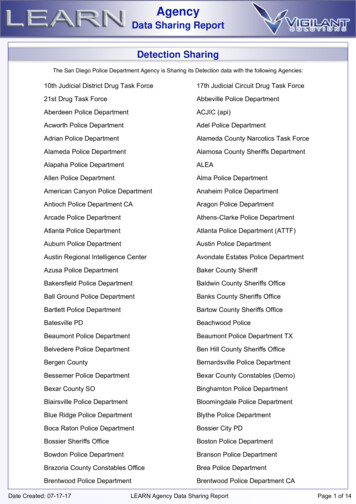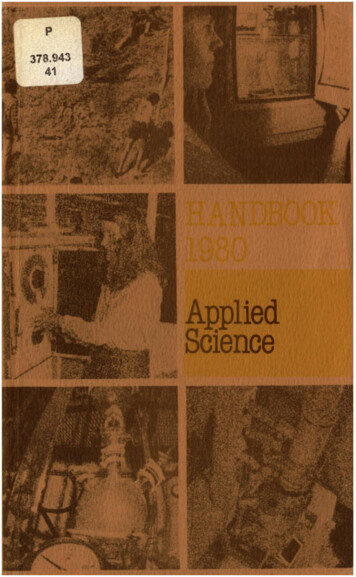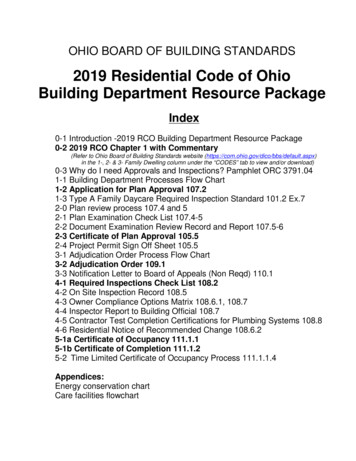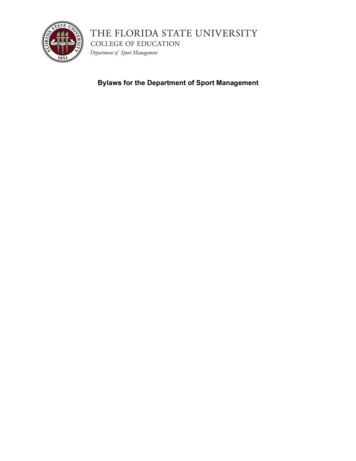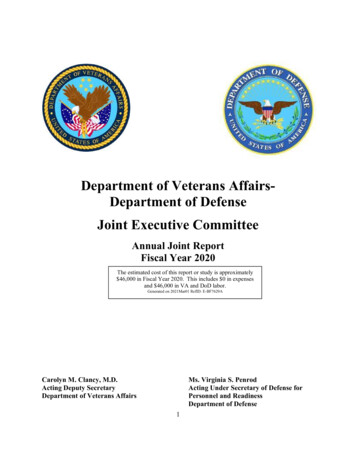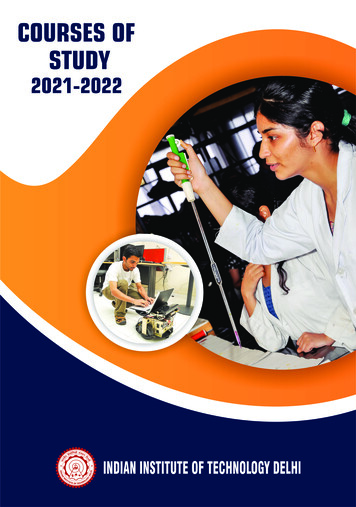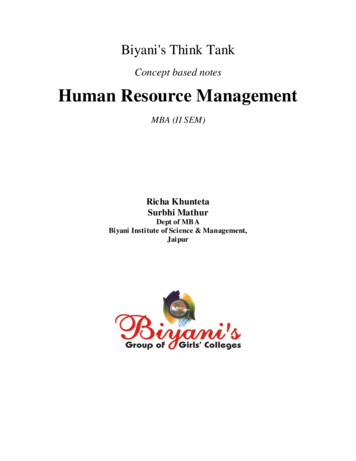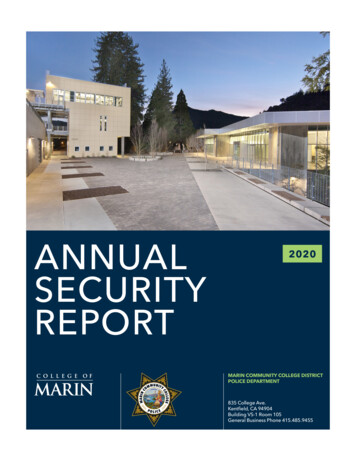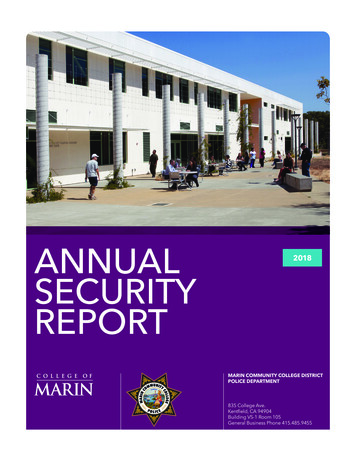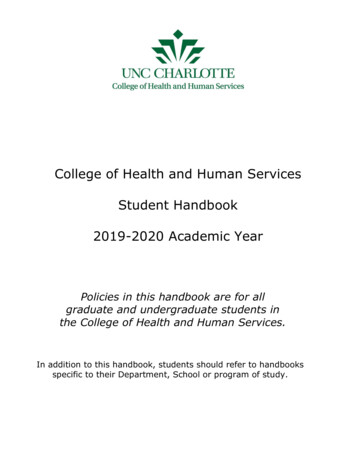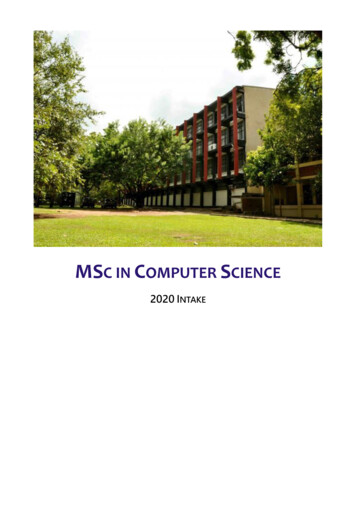
Transcription
MSC IN COMPUTER SCIENCE2020 INTAKE
DEPARTMENT OF COMPUTER SCIENCE & ENGINEERINGUNIVERSITY OF MORATUWAPage 2 of 21
SPECIALIZATIONSThe MSc in Computer Science (MSc in CS) postgraduate degree program isdesigned to provide practicing professionals with a greater depth of technicalknowledge as well as exposure to emerging and niche areas.The following specializations within the MSc in CS program allow students toconcentrate on an area of study that interests them: Cloud Computing Computer Networks Data Science , Engineering and Analytics Information Systems Management Mobile Computing Parallel Computing Security Engineering Software ArchitectureDetails of the specializations are as follows: Cloud ComputingCloud computing has transformed the way we host and run applications,enabling us to acquire vast, scalable computing and storage resources as andwhen needed. As every computing device and application now having a cloudbackend, there is a huge demand for professionals that can design and developcloud-enabled applications as well as integrate and manage cloud services.This specialization is targeted towards preparing cross-skilled cloud architects,engineers, and developers to address this rising demand. Areas of study underthe specialization include cloud technologies, cloud and client-side softwaredevelopment, distributed systems, as well as fundamentals of cloud systems,information security, and networking.Page 3 of 21
Computer NetworksThis specialization focuses on the design, operation, and management ofcomputer networks and for those who intend to become senior systemsengineers, network operations center (NOC) managers, and network designand performance engineers. The specialization is designed to providespecialized knowledge and skills in wired/wireless networks, routing, switching,systems engineering, and network security, design, and management, as wellas recent and emerging topics including cloud-based systems, softwaredefined networking, and content concentric networking. Data Science, Engineering, and AnalyticsThe exponential growth of the data accumulated by the mankind has resultedin the phenomenon commonly referred to as Big Data – large, complex datasets that are impossible to comprehend for humans. This specializationexplores the unique challenges and opportunities presented by Big Data. Areasof study under the specialization include data mining, information retrieval,concepts and techniques of machine learning, and the emerging disciplines ofdata science and business intelligence. This specialization is useful forprofessional who would like to embark on a career as data scientists or datamining experts as well as professionals who would like to be equipped with theknowledge to work as software engineers on endeavors related to Big Data. Information Systems ManagementThis specialization focuses on the design, operation, and management of largescale information systems and is intended for those who are planning tobecome senior IT managers, IT project managers and senior IT consultants. Thespecialization is designed to provide specialized knowledge and skills in theareas of information systems management, software engineering, IT projectmanagement, socio-technical analysis of ICT and future trends for digitalenablement.Page 4 of 21
Mobile ComputingThe advancements in computing and communication technologies have fueledan exponential growth in the use of mobile computing and the consumermarket is converging to mobile computing technology at a rate faster than anyother technology in the history. This disruptive growth has already become atrillion Dollar business and the computing industry from leading global playersto small local businesses are preparing for this wonderful paradigm shift. Themobile computing specialization is targeted towards preparing mobilecomputing architects required to drive the next generation, context-awareubiquitous applications, which will be the frontier of the mobile computing andconsumers. The core of the specialization explores topics such as contextawareness, ubiquitous computing, Internet of things, wireless networks, mobileclouds and Cloudlets, innovative user interaction techniques, and developingnext generation mobile applications. Parallel ComputingWe live in the era in which the performance of computing does not improveautomatically as used to be and described by the Moore's Law. Now the way toimprove performance is by using several processing elements in parallel, be itsmart phones or high-end computer servers. As a result, parallel computing hasbecome ever more relevant to a wide range of computing professionals. Thisspecialization explores the challenges and opportunities presented by all formsof parallel computation. Areas of study under the specialization include studyof parallel architectures (ranging from multi-core CPUs and performanceaccelerators such as many-core GPUs to heterogeneous clusters and massivelyparallel systems), concurrency, parallel programming models and techniques,and performance engineering.Page 5 of 21
Security EngineeringThe security of information, software, networks, and systems is one of the mostcritical requirements in computing, irrespective of whether it is organizational,governmental, research, or commercial. This specialization is for those whointend to become security architects in software engineering, securityspecialists in systems integration, and information security engineers. Thespecialization has been designed to match the industry requirement inspecialized knowledge and skills in cryptographic techniques, secure softwaredevelopment, network security, vulnerability assessment, and informationsecurity management. Software ArchitectureThis specialization focuses on the concepts and techniques that lead to superiorsoftware architectures and software systems. It explores areas of study such assoftware architecture styles and patterns, enterprise software architectures,quality engineering, requirements engineering, and distributed computing. Thespecialization is equally useful for professionals who would like to embark on acareer as software architects as well as professionals who would like to becomehighly productive software engineers.Page 6 of 21
COURSE MODULES AND PROGRAM STRUCTUREThe MSc in CS postgraduate degree program consists of compulsory modules,specialization-specific compulsory modules, elective modules, and a compulsoryresearch project. The research project is expected to be in the area of specialization.The program is structured as a six semester (two-year) degree program with eachsemester consisting of 12 weeks of academic activities. Lectures are held onOne/Two weekdays from 5.30 PM to 7.30 PM in Colombo and on Saturdays in theUniversity of Moratuwa. Lectures are also supplemented with online interactions viaMoodle, Yammer, Google Hangout, Skype, Lync, etc.In a typical study program arrangement, the first three semesters consist of taughtcourse modules while the fourth semester is a mix of taught courses and research.The final two semesters are used for the research project and dissertation writing.The following are the course modules of the program:CodeCourse ModulesCreditsCS5101IT Project Management3CS5102IT Policy and Planning3CS5103Information Systems Management3CS5116IT and Society3CS5202Advanced Operating Systems3CS5203Advanced Compilers3CS5212Software Architecture Concepts3Page 7 of 21
CodeCourse ModulesCreditsCS5213Enterprise Software Architecture3CS5214Principles of Operating Systems1.5CS5222Software Process and Management3CS5223Rapid Application Development3CS5224Advanced Databases3CS5225Parallel and Concurrent Programming3CS5226Secure Program Development3CS5227Data Mining3CS5228Principles of Software Design and Software Engineering3CS5229Big Data Analytics Technologies3CS5230Database Managements Systems3CS5242Software Development on Cloud Platforms3CS5243Client Side Application Development3CS5250Human Computer Interaction1.5CS5251Local-Language Computing1.5CS5252Requirements Engineering1.5CS5253Software Quality1.5CS5270Many / Multi-Core Programming3CS5312High Performance Computer Architecture3CS5313Fault Tolerant Computing3Page 8 of 21
CodeCourse ModulesCreditsCS5314Embedded Systems3CS5341Cloud Technologies and Systems3CS5401System and Network Design3CS5404Computer and Network Security3CS5405Performance Modeling and Analysis3CS5406Performance Engineering of Computer Systems3CS5414Current Topics in Computer Networks3CS5422Digital Communication3CS5423Information Security Theory and Practice3CS5424Cryptography Engineering3CS5425Information Security and Cryptography3CS5426e-Commerce3CS5429Distributed Computing3CS5430Mobile Computing3CS5431System Audit and Vulnerability Assessment3CS5440Wireless Access Networks3CS5441Mobile and Ubiquitous Application Development3CS5442Pervasive Computing3CS5450System and Network Administration3CS5451Broadband Networks1.5Page 9 of 21
CodeCourse ModulesCreditsCS5452Wireless Networks1.5CS5453Security Management1.5CS5454Digital Forensics1.5CS5455Networks and Protocols1.5CS5456Security ManagementCS5457Legal Aspects of Computer SecurityCS5460Operating Systems Security3CS5461Network Security3CS5462Embedded Systems Security3CS5512Advanced Image Processing3CS5513Computer Vision3CS5612Pattern Recognition3CS5613Neural Networks3CS5614Bio-Informatics3CS5615Information Retrieval3CS5616Natural Language Processing3CS5617Data Science3CS5618Business Intelligence3CS5619Information Systems for Digital Society3CS5620Information Systems Modelling and Design33Page 10 of 211.5
CodeCourse ModulesCreditsCS5621Machine Learning3CS5650Statistical Analysis1.5CS5651Statistical Inference3CS5701Advanced Algorithms3CS5814IT Law3CS5850e-LearningCS5912Current Topics in Computer Science3CS5921Independent Study 11CS5922Independent Study 21CS5923Directed Study 11.5CS5924Directed Study 21.5CS5925Directed Study 31.5CS5926Directed Study 41.51.5Students are required to earn 60 credits to graduate. 20 of those credits would comefrom the Research/Industry Projects. Four more credits would come from modulesthat prepare the students for the Research Project. That leaves 36 credits to beearned by taught modules. The combination of taught modules to be takendepends on the specialization. If you need any additional information regarding thespecializations, course modules or the program structure, please contact the MScin CS course coordinators through the contact details given onhttp://postgrad.cse.mrt.ac.lk website.Note:Offering of a particular specialization, or a course module during a givenacademic year is subject to having the minimum number of registrations.Page 11 of 21
RESOURCE PERSONSThe MSc in CS postgraduate degree program is conducted by senior academics ofthe University of Moratuwa with research specializations in specific study areascomplemented by specialists from the industry.Prof. Gihan DiasBSc Eng Hons (Moratuwa), MSc (UCSB), PhD (UCD), MIE(SL), CEngProfessor, Dept of Computer Science and Engineering, University of MoratuwaProf. Sanath JayasenaBSc Eng Hons (Moratuwa), MSc (UIUC), PhD (UIUC), MIE(SL), CEngSenior Lecturer, Dept of Computer Science and Engineering, University of MoratuwaDr. Adeesha WijayasiriBSc Eng. (Hons) (Moratuwa), MSc (UFL), PhD (UFL)Lecturer, Dept of Computer Science and Engineering, University of MoratuwaDr. Chandana GamageBSc Eng Hons (Moratuwa), MEng (AIT), PhD (Monash), MIE(SL), CEngSenior Lecturer, Dept of Computer Science and Engineering, University of MoratuwaPage 12 of 21
Dr. Charith ChitraranjanBSc Eng. (Hons) (Moratuwa), MSc (NDSU), PhD (NDSU)Senior Lecturer, Dept of Computer Science and Engineering, University of MoratuwaDr. Chathura De SilvaBSc Eng Hons (Moratuwa), MEng (NTU), PhD (NUS), MIE(SL), CEngSenior Lecturer, Dept of Computer Science and Engineering, University of MoratuwaDr. Dulani MeedeniyaBSc Hons (Peradeniya), MSc (Moratuwa), PhD (St Andrews)Senior Lecturer, Dept of Computer Science and Engineering, University of MoratuwaDr. Indika PereraBSc Eng Hons (Moratuwa), MBS (Colombo), MSc (Moratuwa), PhD (St Andrews), PGDBM(Colombo), MIE (SL), CEngSenior Lecturer, Dept of Computer Science and Engineering, University of MoratuwaDr. Kutila GunasekeraBSc Eng Hons (Moratuwa), PhD (Monash)Senior Lecturer, Dept of Computer Science and Engineering, University of MoratuwaPage 13 of 21
Prof. Ranjith PereraBSc Eng (Sri Lanka), Dip Ing (Aachen), Dr Ing (Aachen), MIE(SL), CEngProfessor, Dept of Electrical Engineering, University of MoratuwaDr. Shantha FernandoBSc Eng Hons (Moratuwa), MPhil (Moratuwa), PhD (Delft), MIE(SL), MIEE (London), CEngSenior Lecturer, Dept of Computer Science and Engineering, University of MoratuwaDr. Shehan PereraBSc Hons (Colombo), MSc (NDSU), PhD (NDSU)Senior Lecturer, Dept of Computer Science and Engineering, University of MoratuwaDr. Surangika RanathungaBSc Eng Hons (Moratuwa), MSc (Moratuwa), PhD (Otago)Senior Lecturer, Dept of Computer Science and Engineering, University of MoratuwaMs. Vishaka NanayakkaraBSc Eng Hons (Moratuwa), Tech Licentiate (Chalmers),Senior Lecturer, Dept of Computer Science and Engineering, University of MoratuwaPage 14 of 21
Dr. Uthayasanker ThayasivamBSc Eng Hons (Moratuwa), PhD (U. Georgia).Senior Lecturer, Dept of Computer Science and Engineering, University of MoratuwaDr. Sapumal AhangamaBSc Eng Hons (Moratuwa), PhD (NUS).Lecturer, Dept of Computer Science and Engineering, University of MoratuwaMr. Chamara DisanayakeMSc (Moratuwa), BSc Eng. (Hons) (Moratuwa), MBS(Colombo), AMIE(SL)Manager-Engineering, LK Domain RegistryDr. Prathibha MahanamahewaLLB Hons (Colombo), LLM Hons (Melbourne), PhD (Queensland), Attorney-at-LawSenior Lecturer, Faculty of Law, University of ColomboDr. Srinath PereraBSc Eng Hons (Moratuwa), MS (Indiana), PhD (Indiana)Vice President - Research, WSO2Page 15 of 21
ELIGIBILITY REQUIREMENTSThe MSc in CS postgraduate degree program requires a prospective candidate tofulfill the following eligibility criteria for course enrollment. The degree of BSc Engineering of the University of Moratuwa in a relevantfield, as may be approved by the Senate;OR Any other four-year degree in Engineering, Science or Technology from arecognized University, in a relevant field of specialization, as may beapproved by the Senate;OR Any other three-year degree in Engineering, Science or Technology from arecognized University, in a relevant field of specialization, and a minimumperiod of experience of one (01) year as may be approved by the Senate;OR Any recognized category of membership of a recognized ProfessionalInstitute, obtained through an academic route, with a minimum period ofexperience of one (01) year as may be approved by the Senate.Page 16 of 21
SELECTION PROCESSThe selection to the MSc in CS postgraduate degree program is through an opencompetitive process. The applicant’s educational qualifications, professionalqualifications, commitment to advanced study, demonstrated aptitude for research,English language skills required for preparation of study/research outcomes andknowledge dissemination, and academic/professional references all contribute tothe evaluation of a candidate. Following are the steps in the selection process:1.Each applicant is evaluated for the conformity with the applicable eligibilitycriteria based on the information provided with the application. Allapplicants satisfying the eligibility criteria will be invited to a selection test.2.The applicants who satisfied the eligibility criteria will appear for an onlineselection test of one-hour duration. The selection test consisting ofmultiple-choice, short-answer and similar questions will examine analyticalskills, conceptual knowledge, and topic-specific knowledge in areas suchas Programming, Data Structures and Algorithms, Operating Systems,Computer Systems and Organization, Software Engineering, SoftwareArchitecture, Theory of Computing, Databases, Artificial Intelligence,Networking, Computer Security, Professional Practice, and ManagementInformation Systems. In addition, the candidates will be required to write ashort essay (of less than 250 words) on a given topic. All applicants who aresuccessful at the selection test will be invited to a selection interview.3.The applicants who were successful at the selection test will face aninterview of 5-10 minute duration by an interview panel of not less thanthree persons. The interview will ascertain the applicant’s suitability andcompetency for the study program.4.Based on the marks received for the selection test and the selectioninterview, each applicant will be ranked into a “Selected Candidates List”and a “Waiting List”. After the selection process, all applicants will beinformed of their application status. If an applicant from the SelectedCandidates List fails to enroll in the program within the stipulated period,that opportunity will be afforded to an applicant from the Waiting List.Page 17 of 21
COURSE FEE AND PAYMENT STRUCTUREThe total fee for the course is Rs. 575,000/-, which includes a registration fee ofRs.75,000/- and a course fee of Rs.500,000/-. It can be paid according to either planA or B as shown below.Plan Ard Course registration fee - Rs. 75,000/- (by 23October 2020) Full course fee - Rs. 500,000/- (by 18 December 2020)thORPlan Brd Course registration fee - Rs. 75,000/- (by 23 First installment – Rs. 250,000/- (by 18 Second installment – Rs. 200,000/- (by 04 June 2021) Third installment – Rs. 50,000/- (by 04thOctober 2020)December 2020)ththMarch 2022)Above fees include Annual Academic Registration Fees, Semester Examination Fees,and a Library Deposit of Rs. 2,500/-. In the case of change of government taxes, thestudent will have to incur the additional tax amount.Page 18 of 21
HOW TO APPLY1.Pay the application-processing fee.The application processing fee of Rs. 2,000/- may be paid either toUniversity Shroff (weekdays from 9.00 AM to 12.30 PM and 1.30 PM to3.00 PM) or as a payin voucher of Rs. 2,000/- obtainable at any Bank ofCeylon branch by paying Rs. 2,000/- to the credit of “University ofMoratuwa – A/C No. 306836”. You may also make an online transfer to thesame account.2.Fill up the online application form at http://postgrad.cse.mrt.ac.lk, submitand print the completed application.You need to attach all documents indicated in the application form andsubmit by the application deadline. The copies of degree certificate andthe academic transcript you upload must be certified with digitalsignatures by you and your employer. The digital signature should be acertificate-based Digital ID, obtained either from a cloud-based trustservice provider, or from the signer's local system. More information onthe required type of digital signature can be found here. Once submittedyou will receive a PDF of the filled application as a record.Page 19 of 21
3.Arrange for Letters of Recommendation.You are required to provide two (02) Letters of Recommendation.Ensure that your reference forms are sent (emailed) to the relevant referees.Request the recommender to use the same e-mail address that you usedwhile filling up the application, and request the recommender to use theofficial e-mail address whenever possible.Once the referees have completed the reference form, they can submit itonline. The recommender will receive a confirmation e-mail with anattached PDF as a record. You will also receive a notification to the providede-mail address.4.Once your application is processed, you will be notified via e-mail whetheryou are invited for writing and selection tests and interviews or not. Youmay also receive e-mail notifications if the selection committee has anyqueries about your application.If you are invited to the selection test (usually will be informed within 1week from the application deadline), prepare the following applicationpack and have it ready at the selection test:oA printed copy of the completed and signed “Application Form”oYour National Identity Card (NIC), Driving License, or PassportoOriginal certificates and copies of academic/professionalqualifications, membership of professional institutes, etc.oUpdated “Curriculum Vitae” of the applicantoCompleted “Letter of Consent Form” from the employer (if applicable)oLetter of sponsorship (if applicable)oCopy of the application processing fee receiptPage 20 of 21
postgrad.cse.mrt.ac.lkPage 21 of 21
University of Moratuwa. Lectures are also supplemented with online interactions via Moodle, Yammer, Google Hangout, Skype, Lync, etc. In a typical study program arrangement, the first three semesters consist of taught course modules while the fourth semester is a mix of taught courses and research.
